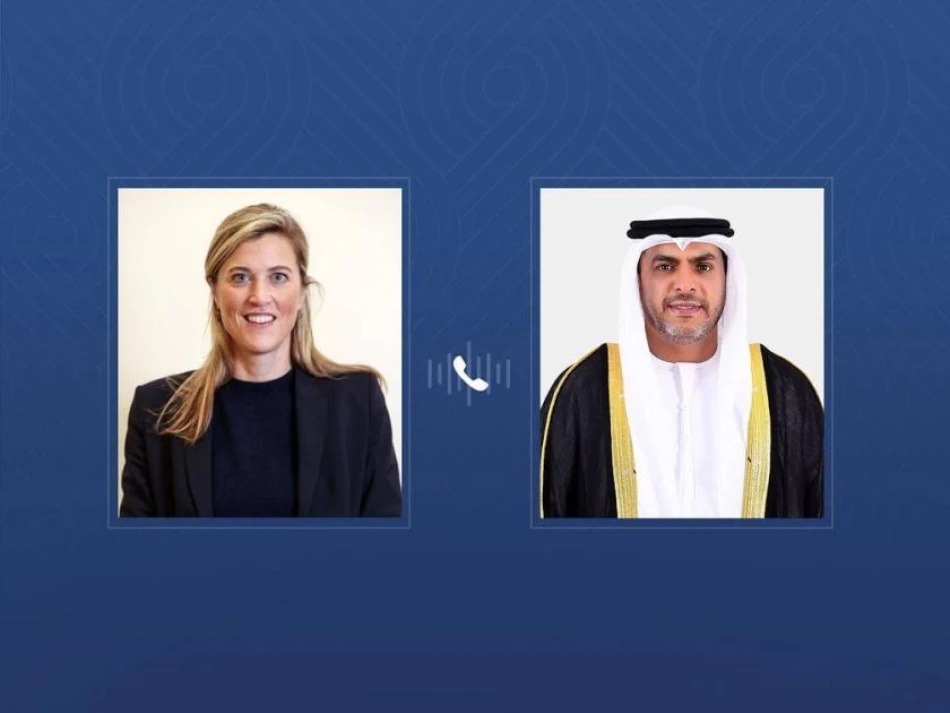
Belgium Praises UAE's Unwavering Support in Prosecuting Criminals
UAE-Belgium Extradition Deal Signals New Era in Cross-Border Crime Fighting
The United Arab Emirates has successfully extradited three wanted individuals to Belgium, including high-profile suspects Othman Al-Baluti and Georgi Vis, marking a significant milestone in international judicial cooperation between the two nations. This operation, executed under a bilateral extradition treaty that became effective in November 2022, demonstrates how Gulf states are increasingly positioning themselves as reliable partners in global law enforcement efforts.
Strategic Partnership Takes Shape
UAE Justice Minister Abdullah bin Sultan Al Nuaimi and Belgian Justice Minister Annelies Verlinden conducted a phone call following the suspects' arrival in Belgium, emphasizing their shared commitment to combating organized crime and drug-related violence. The extradition was carried out based on final rulings from Dubai's Court of Cassation, showcasing the UAE's judicial system's alignment with international standards.
The timing is particularly significant as both countries face mounting pressure from transnational criminal networks that exploit jurisdictional gaps. Belgium, serving as a major European gateway for drug trafficking, has been seeking stronger partnerships with Middle Eastern nations where criminal organizations often establish operational bases.
Beyond Bilateral Cooperation
Regional Implications for Gulf States
This extradition reflects a broader trend among Gulf Cooperation Council members to strengthen their international legal frameworks. The UAE's approach mirrors similar efforts by Saudi Arabia and Qatar to enhance their global judicial partnerships, particularly as these nations diversify their economies and seek greater integration with international financial systems.
The move also signals the UAE's continued efforts to shed its historical reputation as a haven for financial crimes and money laundering. By demonstrating robust cooperation in high-profile cases, Dubai and Abu Dhabi are reinforcing their positions as trustworthy international business hubs.
European Perspective on Middle Eastern Partnerships
For Belgium, this successful extradition represents a crucial victory in its ongoing battle against organized crime networks that have increasingly used Middle Eastern financial centers to launder proceeds from European drug trafficking operations. The cooperation agreement, signed in December 2021, came at a time when Belgian authorities were intensifying their crackdown on Antwerp's cocaine trade.
Minister Verlinden's explicit praise for UAE authorities suggests that European nations are recognizing the strategic value of Gulf partnerships in addressing crimes that transcend traditional geographic boundaries.
Implications for International Justice
This extradition case establishes important precedents for how emerging economies can participate meaningfully in global law enforcement networks. Unlike previous decades when such cooperation was primarily between Western nations, the UAE-Belgium partnership demonstrates how Middle Eastern legal systems can effectively interface with European judicial processes.
The success of this operation will likely encourage other Gulf states to pursue similar bilateral agreements, potentially creating a more integrated approach to combating transnational crime across the Europe-Middle East corridor.
As international criminal networks become increasingly sophisticated in exploiting jurisdictional boundaries, partnerships like the UAE-Belgium extradition treaty represent essential tools for maintaining global financial stability and security. The effectiveness of this cooperation will serve as a model for other nations seeking to strengthen their international judicial relationships in an era of complex, cross-border criminal enterprises.
Most Viewed News

 Omar Rahman
Omar Rahman






